As a recruiter or hiring manager, finding the right Product Owner can be a game-changer for your organization's product development process. Many companies underestimate the importance of this role, often confusing it with project management or mistakenly assuming any team member can fill the position. However, a skilled Product Owner is the bridge between stakeholders, development teams, and customers, ensuring that products meet business objectives and user needs.
This guide will walk you through the essential steps to hire a top-notch Product Owner, from understanding the role to conducting effective interviews. We'll also cover key skills to look for and provide actionable tips to streamline your hiring process. For a deeper dive into the skills required for a Product Owner, check out our comprehensive skills guide.
Table of contents
Why Hire a Product Owner?
Hiring a Product Owner can help address key business challenges in product development and management. For instance, if your company is struggling with unclear product vision or misaligned priorities between stakeholders, a Product Owner can step in to resolve these issues.
A skilled Product Owner can bring value by:
- Defining and maintaining the product backlog
- Ensuring effective communication between the development team and stakeholders
- Maximizing the value of the product
Before committing to a full-time hire, consider your company's specific needs and project scope. If you're unsure, starting with a consultant or conducting a Product Owner skills assessment can help determine if a permanent position is necessary.
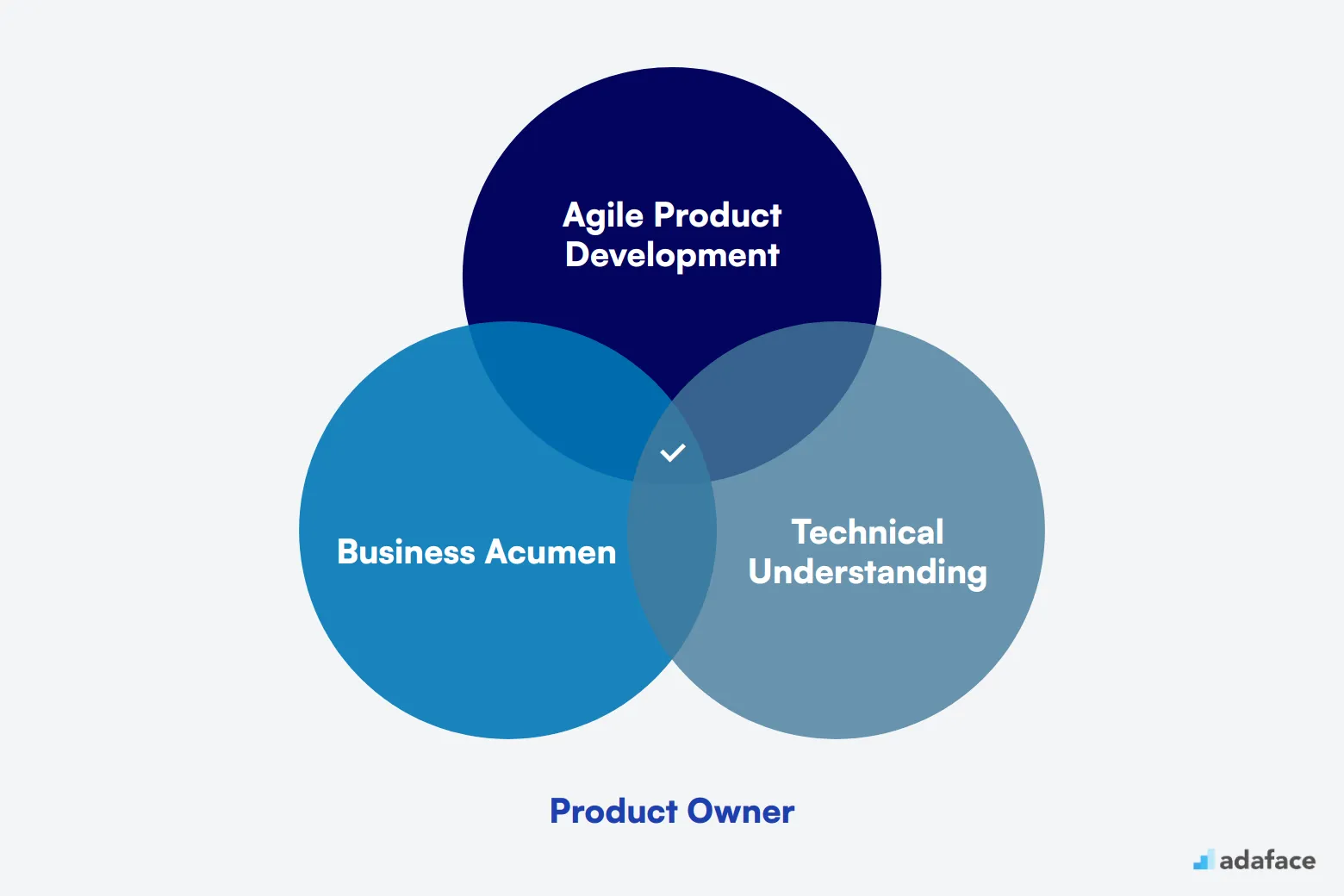
What does a Product Owner do?
A Product Owner acts as the bridge between the development team and the stakeholders, ensuring that the product delivers maximum value. They manage the product backlog, prioritize features, and define user stories to guide the team in achieving project goals.
Day-to-day tasks of a Product Owner include:
- Collaborating with stakeholders to understand requirements and align the product vision.
- Creating and maintaining a well-defined product backlog.
- Prioritizing tasks for the development team based on stakeholder needs and business value.
- Conducting sprint planning meetings and reviews to ensure alignment on objectives and progress.
- Continuously evaluating the product development process to maximize efficiency and improve outcomes. For more information on the specific skills required, visit our skills required for Product Owner page.
Product Owner Hiring Process
Hiring a Product Owner is a crucial step in building a successful product team. The process typically takes around 4-6 weeks, depending on the urgency and the number of candidates.
- Job Description: Craft a detailed job description outlining the roles, responsibilities, and qualifications required.
- Sourcing Candidates: Post the job opening on relevant job boards, leverage professional networks, and consider internal recommendations.
- Resume Screening: Review resumes and shortlist candidates based on their experience, skills, and cultural fit.
- Skills Assessment: Evaluate candidates' technical and product management skills using online assessments or case studies.
- Interviews: Conduct structured interviews to assess candidates' problem-solving abilities, communication skills, and product vision.
- Final Decision: Collaborate with the hiring team to select the best candidate and extend an offer.
Key skills and qualifications for a Product Owner
Crafting the ideal candidate profile for a Product Owner can be tricky. It's important to distinguish between must-have skills and nice-to-have qualities. While some skills are universally valued, others may depend on your specific project or company needs.
To help you start your Product Owner hiring process, here's a breakdown of common required and preferred skills. Remember, this list is a starting point - you'll need to tailor it to your unique requirements.
| Required skills and qualifications | Preferred skills and qualifications |
|---|---|
| Bachelor's degree in Business, Computer Science, or related field | Experience with JIRA, Confluence, or similar project management tools |
| 3+ years of experience in a Product Owner or similar role | Certified Scrum Product Owner (CSPO) certification |
| Strong understanding of Agile methodologies | Experience working with cross-functional teams |
| Excellent communication and leadership skills | Knowledge of UX/UI design principles |
| Proven ability to define product requirements and develop user stories | Strong analytical and problem-solving skills |
Best Platforms to Hire Product Owners
Now that you have crafted an effective job description, it's time to list it on job boards to source potential candidates. Choosing the right platforms can help you reach a wide range of talents suitable for your needs. Let's explore some of the best options to connect with qualified Product Owners.
LinkedIn Jobs
Useful for listing full-time positions due to its wide reach and professional networking features.

Indeed
Ideal for a comprehensive approach to hiring with its broad user base and easy-to-use interface.

FlexJobs
Best for finding remote or telecommuting product owners, with a focus on flexible work arrangements.
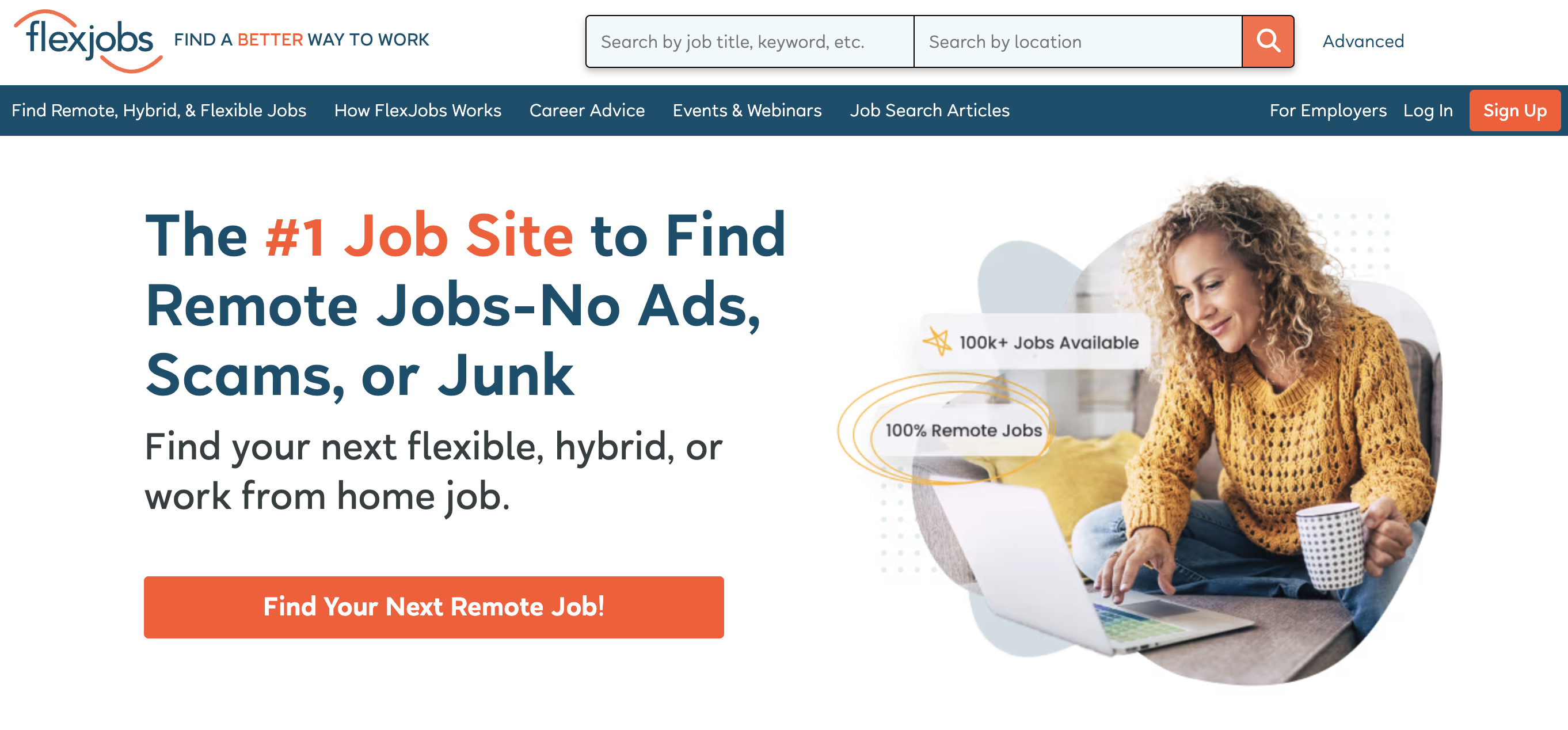
For broader reach, consider platforms like LinkedIn Jobs and Indeed, which are excellent for full-time positions. Remote-centric roles can be posted on FlexJobs, We Work Remotely, and Remote OK to tap into skilled remote candidates. If you’re looking for freelance or startup roles, Upwork and AngelList are your go-to options. Platforms like Glassdoor and ZipRecruiter can give you additional insights into candidates who value company culture and quick job placements. Using an online assessment platform can further streamline your hiring process.
Which skills tests should you use to assess Product Owners?
Hiring a Product Owner requires ensuring they possess a mix of technical expertise, business acumen, and communication skills. Skills tests can help objectively evaluate candidates for these attributes, streamlining the recruitment process.
The Product Owner Test is tailored to measure the candidate's understanding of Agile principles and their ability to translate business needs into actionable development tasks. This is a direct way to gauge their potential performance in a Product Owner role.
To ensure the candidate's proficiency with Jira Software, the Jira Software Cloud Test is recommended. It assesses their ability to manage and track project tasks efficiently, a vital skill for modern Product Owners.
Communication is key for Product Owners. The Communication Test evaluates how well candidates articulate ideas and facilitate conversations between technical and non-technical teams.
The Product Manager Assessment Test is useful to determine if candidates possess the strategic mindset necessary for product development. It helps identify candidates who can balance customer needs and business goals effectively.
Lastly, a Business Analyst Assessment Test can be beneficial in assessing analytical abilities. This test measures the candidate's capability to dissect and interpret data to make informed product decisions, complementing the Product Owner's role.
Recommended Case Study Assignments for Hiring Product Owners
Case study assignments are an excellent tool for assessing a candidate's potential to perform in a real-world setting, especially for roles like Product Owner. However, it's important to consider the potential drawbacks, such as their time-consuming nature, which may discourage some candidates from participating. Despite these challenges, well-designed case studies can offer valuable insights into a candidate's skills and thought processes.
Product Vision and Roadmap Creation: This case study focuses on the ability of the candidate to craft a compelling product vision and translate this into a realistic roadmap. It's crucial for understanding how a potential hire prioritizes features and communicates long-term strategy. This approach will help in identifying candidates who have a strong grasp of product management principles.
Stakeholder Management Scenario: This assignment evaluates how candidates handle complex stakeholder dynamics, an important aspect of a Product Owner's role. The task involves simulating interactions with various stakeholders and requires candidates to balance competing priorities effectively. It is recommended for assessing both communication and negotiation skills.
Feature Prioritization Exercise: This case study involves evaluating how candidates prioritize product features based on given criteria such as customer feedback, business value, and technical feasibility. It helps in identifying those who can make strategic decisions under constraints, which is a key skill for any successful Product Owner.
How to structure interview stage for hiring Product Owners?
After candidates successfully pass skills tests, it's important to move them to technical interviews where their hard skills are evaluated. Skills tests are great for filtering out unqualified applicants, but they do not always identify the best-suited candidates for the Product Owner role. This stage should include specific interview questions to assess key competencies.
Here are some sample interview questions you can use when interviewing potential Product Owners:
- How do you prioritize backlog items? This question assesses their understanding of backlog management and prioritization techniques.
- Describe how you handle stakeholder disagreements. It reveals their conflict resolution and communication skills.
- What strategies do you use to keep the development team aligned with product goals? This checks their ability to maintain team focus.
- Can you give an example of a time when you iterated on a product based on user feedback? This question evaluates their adaptability and commitment to user-centric design.
- How do you define the success of a product feature? This assesses their analytical skills and ability to measure outcomes. To learn more about the skills required for a Product Owner, refer to our comprehensive guide.
How much does it cost to hire a Product Owner?
Hiring a Product Owner involves understanding salary variations based on location, experience, and company size. In the US, salaries range from $78,739 to $168,539 annually, with a median of $115,198. In India, the range is INR 772,105 to INR 2,236,072, with cities like Gurgaon offering higher pay scales. These figures highlight the importance of considering geographical salary trends when budgeting for a Product Owner role.
Product Owner Salary in the United States
The average salary for a Product Owner in the United States ranges from $78,739 to $168,539, with a median of $115,198. Salaries can vary based on location, experience, and company size.
Top-paying cities for Product Owners include Nashville, TN (median: $131,747) and Phoenix, AZ (median: $130,812). On the other hand, cities like Salt Lake City, UT (median: $109,479) and Dallas, TX (median: $108,384) offer slightly lower salaries.
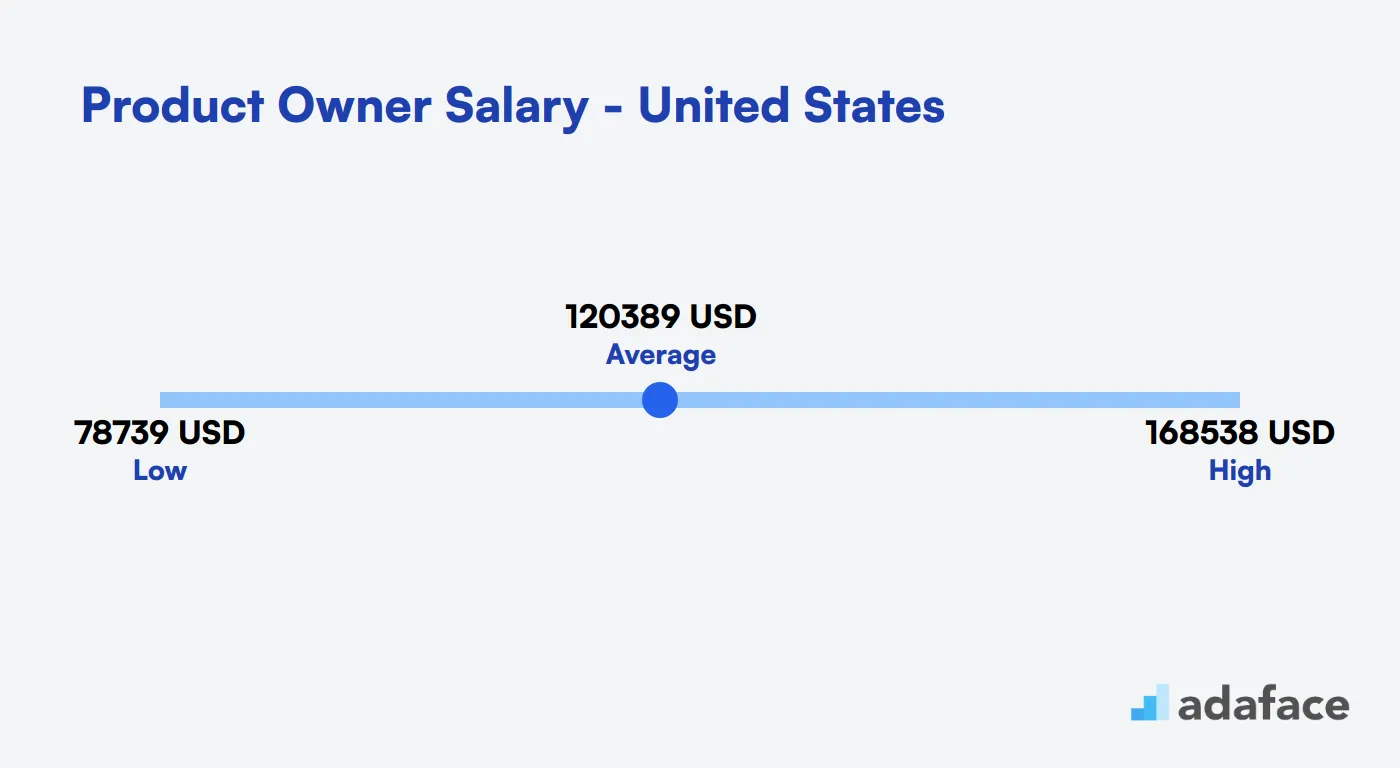
Product Owner Salary in the United Kingdom
In the UK, Product Owner salaries vary based on experience and location. As of 2023, the average annual salary for a Product Owner in the UK ranges from £45,000 to £75,000. London-based Product Owners typically earn on the higher end of this scale, with some senior roles commanding salaries up to £100,000 or more.
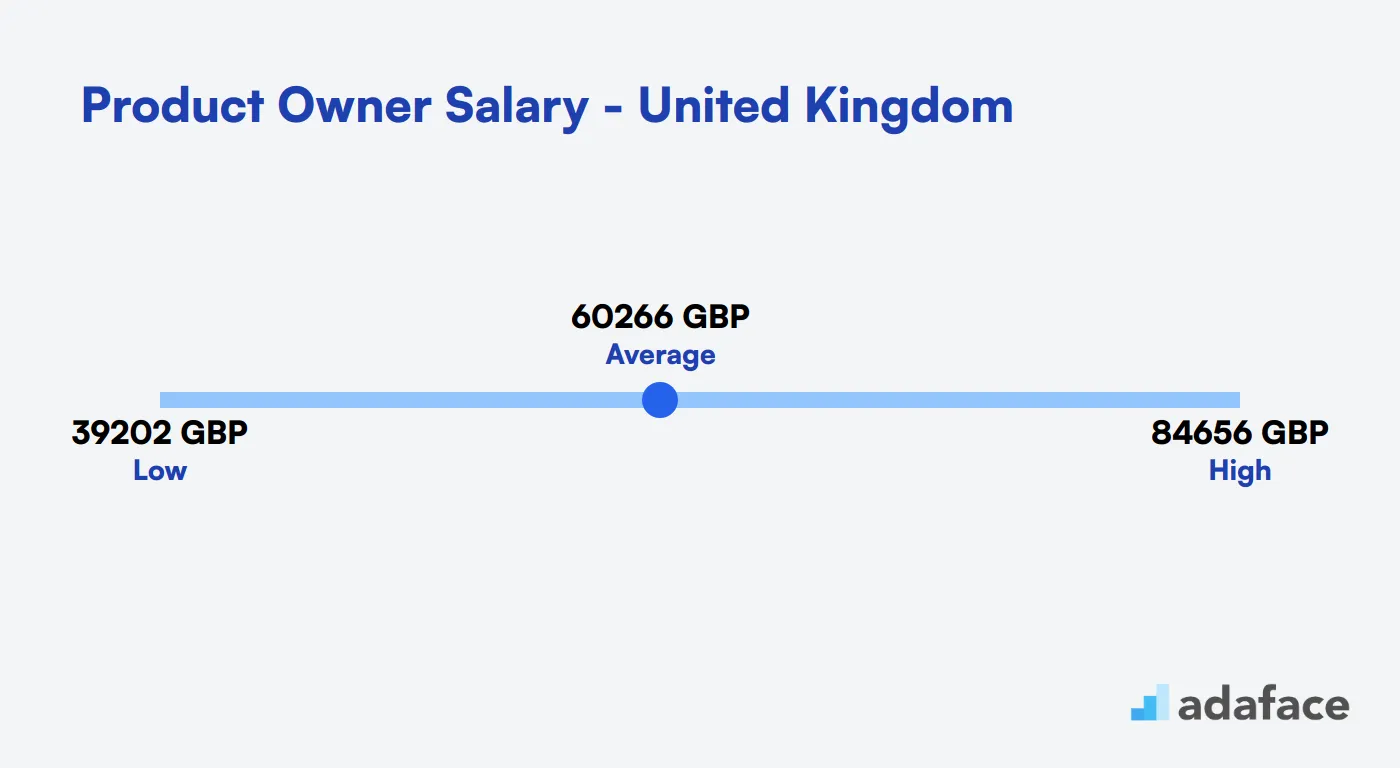
Product Owner salary India
In India, the salary for a Product Owner varies significantly across different cities. The average salary ranges from around INR 772,105 to INR 2,236,072 per year. Cities like Gurgaon and Pune offer higher salaries with medians at around INR 1,507,687 and INR 1,484,481 respectively. Conversely, Ahmedabad and Noida are on the lower end, with medians at approximately INR 652,949 and INR 842,137.
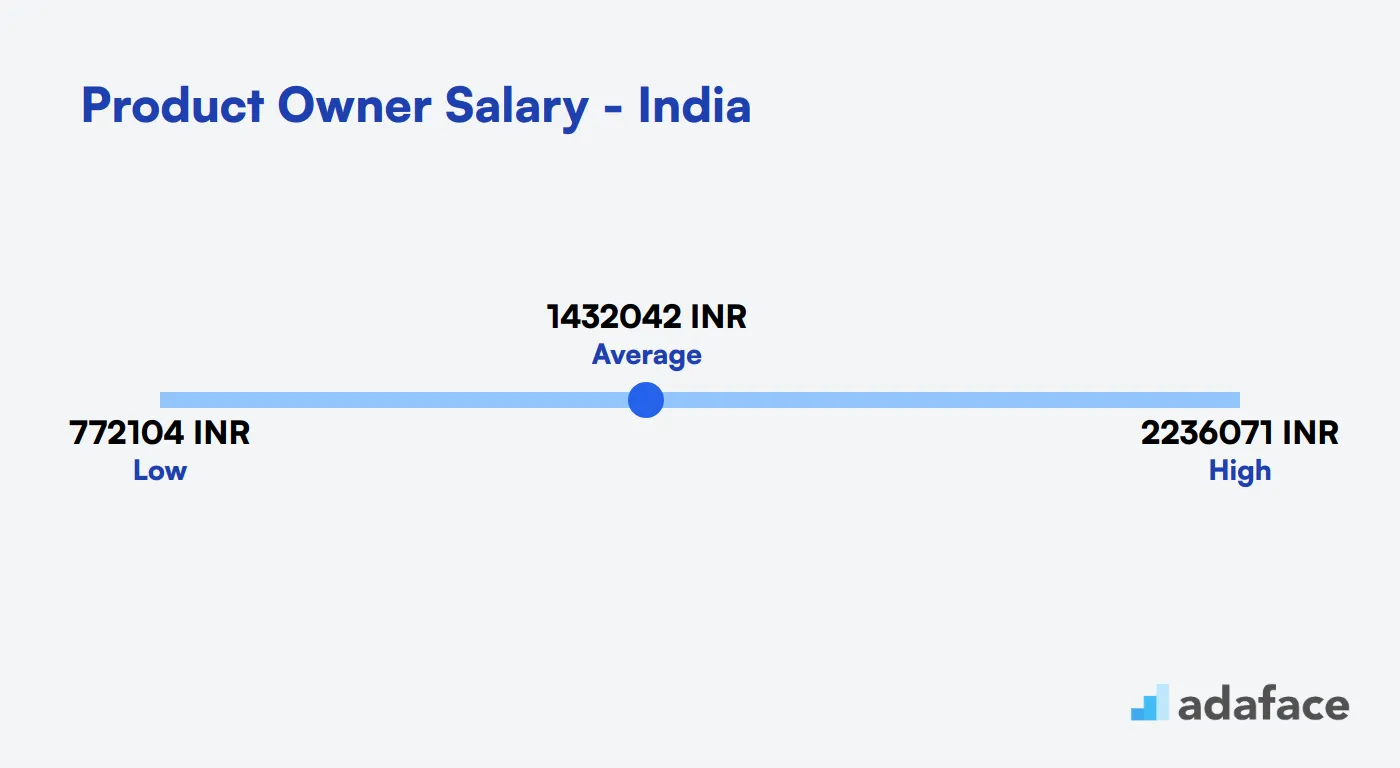
What's the difference between a Product Owner and a Scrum Master?
Many people often confuse the roles of a Product Owner and a Scrum Master, as both positions play critical roles in Agile development environments. However, their responsibilities and focus areas are distinct, leading to different skill sets and interactions with the team.
The Product Owner primarily concentrates on the product vision and the backlog. They are responsible for defining features, prioritizing tasks, and ensuring that the final product meets user needs. This role requires high engagement with stakeholders and is focused on making product decisions, acting as the voice of the customer. Key skills include strategic planning and a visionary outlook, using tools like backlog management software (e.g., JIRA, Trello).
In contrast, the Scrum Master is dedicated to facilitating the Scrum process. Their responsibilities include coaching the team, removing impediments, and ensuring that everyone adheres to Agile practices. Though they have moderate engagement with stakeholders, their key skills lie in facilitation and conflict resolution. Scrum Masters focus on process decisions and serve as servant leaders within the team, utilizing Agile tools such as JIRA and Miro to manage workflows.
| Product Owner | Scrum Master | |
|---|---|---|
| Primary Focus | Product vision and backlog | Facilitating Scrum process |
| Responsibilities | Define features, prioritize backlog | Coach team, remove impediments |
| Stakeholder Interaction | High engagement | Moderate engagement |
| Key Skills | Visionary, Strategic Planning | Facilitation, Conflict Resolution |
| Decision Making | Product decisions | Process decisions |
| Role in Team | Voice of customer | Servant leader |
| Success Criteria | Product meets user needs | Effective Scrum practice |
| Tools | Backlog tools (JIRA, Trello) | Agile tools (JIRA, Miro) |
What are the ranks of Product Owners?
Product Owner roles can vary across organizations, leading to confusion about their hierarchy. While not all companies use the same titles, understanding common ranks can help recruiters and hiring managers identify the right fit for their team.
- Junior Product Owner: This entry-level position is for those new to the role. They often work under senior Product Owners, learning the ropes of product management and Agile methodologies.
- Product Owner: The standard Product Owner role involves managing the product backlog, collaborating with stakeholders, and ensuring the development team understands requirements. They're responsible for maximizing the value of the product.
- Senior Product Owner: With several years of experience, Senior Product Owners handle more complex products or multiple product lines. They often mentor junior team members and contribute to strategic product decisions.
- Principal Product Owner: This high-level position oversees large-scale products or product portfolios. They focus on long-term strategy and often work closely with executive leadership to align product vision with business goals.
- Chief Product Officer (CPO): The top-ranking product role in many organizations. CPOs are responsible for all product-related activities and strategy across the company. They typically report directly to the CEO.
When hiring for these positions, it's important to assess candidates' skills thoroughly. Consider using product management interview questions to evaluate their expertise and fit for the specific rank you're hiring for.
Hire the Best Product Owners
In this post, we've covered the role of a Product Owner, key skills, and the hiring process. We've explored important qualifications, interview techniques, and how to assess candidates effectively.
The key takeaway is to use well-crafted job descriptions and targeted skills assessments to make your hiring process more accurate. Consider using a Product Owner test to evaluate candidates' knowledge and capabilities. Remember, finding the right Product Owner can significantly impact your product's success and team dynamics.
Product Owner Test
FAQs
Key skills for a Product Owner include strong communication, stakeholder management, strategic thinking, prioritization, and a deep understanding of Agile methodologies. They should also have a mix of technical knowledge and business acumen.
Use a combination of behavioral questions, case studies, and role-playing exercises. Ask about their experience with backlog management, stakeholder communication, and decision-making in previous roles. Consider using our Product Owner assessment test for a comprehensive evaluation.
While there's some overlap, a Product Owner typically focuses on the day-to-day execution of product development within an Agile framework, while a Product Manager has a broader, more strategic role that includes market analysis and long-term product vision.
The hiring process for a Product Owner typically takes 4-6 weeks, including initial screening, skills assessment, interviews, and final decision-making. However, this can vary based on your organization's needs and the candidate pool.
While both are valuable, prioritize Agile expertise and core Product Owner skills. A candidate with strong Agile knowledge and excellent communication skills can often quickly learn industry-specific details.
Include team members in the interview process, especially those who will work closely with the Product Owner. Consider cultural fit questions and, if possible, arrange a brief team interaction session to gauge compatibility.
Be cautious of candidates who struggle to explain their prioritization strategies, lack experience in stakeholder management, or show little interest in user needs and feedback. Also, watch for those who can't provide concrete examples of how they've added value in previous roles.

40 min skill tests.
No trick questions.
Accurate shortlisting.
We make it easy for you to find the best candidates in your pipeline with a 40 min skills test.
Try for freeRelated posts
Free resources



